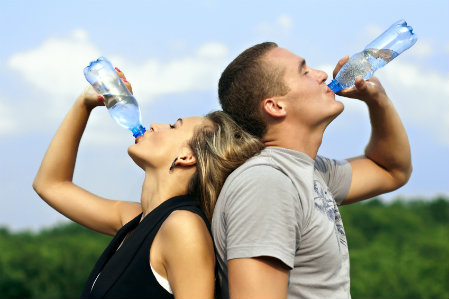Water, often revered as the “elixir of life”, is the staple behind our entire existence yet many people don’t drink nearly enough of it. As a rule of thumb, men should drink around 104 ounces of water a day and women should drink around 72 ounces. Add an additional 8-12 ounces if you exercise, live in a hotter climate, at an elevation over 8,200 feet above sea level or if you are sick, as fever vomiting and diarrhea can cause the body to lose more fluids and therefore become dehydrated.
In addition to simply maintaining your bodily functions, drinking more water can greatly improve your level of health in many ways. Drinking water can help your body rid itself of waste through urine, sweat and bowel movements. Water also flushes out the toxins in your body in the same way. Water also helps your skin to maintain elasticity and reduce unwanted effects of aging.

Water can be used as a tool to lose weight as well. Water is a natural appetite suppressant, making it a great addition to your weight loss regime. Oftentimes when your body is telling you it’s hungry in between meals, you’re really just becoming dehydrated. Drink a glass of water and the feeling will usually go away. Water can also help cut daily caloric intake. Simply substitute a glass of water anytime you would typically choose soda, juice or another sugary beverage.
Drinking plenty of water will help your body feel energized and reduce feelings of fatigue. The brain is composed of 90 percent water, therefore the more water you drink, the better your brain functions. Proper hydration protects the body against illness and disease as well. It’s been shown that people who drink lots of water have a lowered risk of the flu, cancer and even heart attacks. Drinking water can also help to relieve and prevent headaches, migraines, cramps, sprains as well as back pain. Body aches and pains are often caused by dehydration. Drinking water before and throughout exercise helps to increase muscle elasticity and lubricates the joints.
There are a few risks associated with drinking too much and too little water however, so monitor your intake carefully. Drinking too little water leads to dehydration which can lead to mood swings, confusion, constipation and even kidney stones. Drinking too much water on the other hand, can dilute the level of electrolytes in your blood. This is dangerous and can lead to a condition called hyponatremia. Symptoms of hyponatremia include fatigue, confusion, nausea, mood swings, muscle spasms, seizures and even coma. This is why it’s incredibly important to make sure you drink the right amount of water for your body and the conditions mentioned above.




